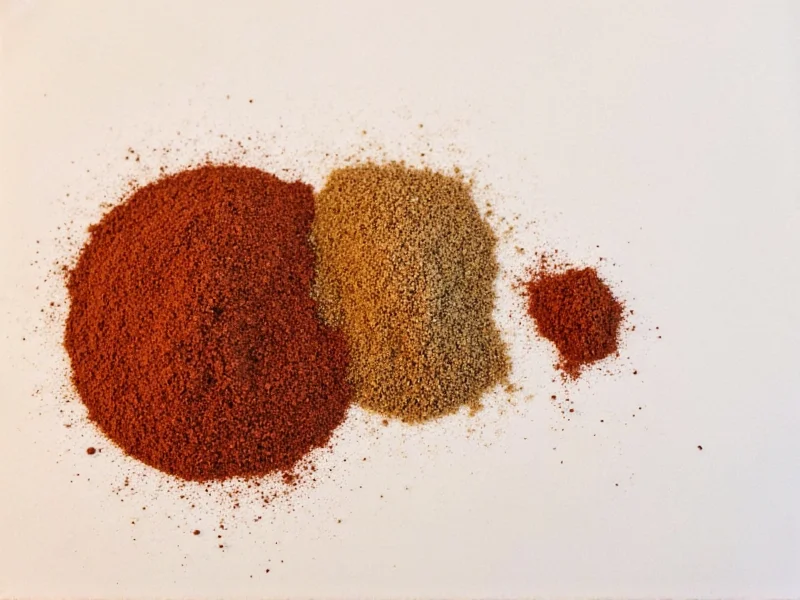When you're preparing a Middle Eastern dish and realize you've run out of sumac, don't panic. This distinctive crimson spice with its citrusy, slightly floral tang plays a crucial role in recipes like fattoush salad, za'atar blends, and grilled meats. Understanding proper sumac spice replacement ensures your dish maintains that characteristic Middle Eastern flavor profile without compromising quality.
Why Sumac Matters in Cooking
Sumac (Rhus coriaria) isn't just a pretty red spice—it delivers a unique flavor balance of tartness without overwhelming acidity, subtle earthiness, and delicate floral notes. Unlike lemon juice which provides pure acidity, sumac offers complexity that enhances rather than dominates dishes. When seeking sumac spice replacement options, consider both the functional role (providing tang) and the flavor profile your recipe requires.
Top Sumac Spice Replacement Options
Lemon Juice and Zest Combination
This sumac alternative works exceptionally well for salad dressings and marinades. The zest provides aromatic oils that mimic sumac's floral notes while the juice delivers acidity. For every tablespoon of sumac called for, use 1 tablespoon fresh lemon juice plus 1 teaspoon finely grated lemon zest. This sumac spice replacement ratio works particularly well in fattoush salad recipes where sumac's visual appeal matters less than its flavor contribution.
Vinegar-Based Substitutes
Certain vinegars can effectively replace sumac when used judiciously:
| Vinegar Type | Substitution Ratio | Best For | Flavor Notes |
|---|---|---|---|
| Apple Cider Vinegar | 1:1 | Salads, grain bowls | Milder acidity with subtle fruitiness |
| White Wine Vinegar | 1:1 | Fish dishes, light sauces | Clean acidity closest to sumac |
| Red Wine Vinegar | 3:4 (use 25% less) | Robust dishes, stews | Bolder flavor, use sparingly |
| Rice Vinegar | 5:4 (use 25% more) | Delicate dishes, dressings | Milder acidity, good for beginners |
Amchoor (Dried Mango Powder)
For authentic Middle Eastern cooking, amchoor makes an excellent sumac spice replacement with its similar tart profile. Use a 1:1 ratio when substituting in dry rubs or spice blends. Amchoor works particularly well as a sumac alternative for za'atar since both are dried fruit powders with complex sour notes. Unlike sumac which has visual impact, amchoor won't provide the characteristic red color, so consider adding a pinch of paprika for appearance.
Tamarind Paste
When replacing sumac in recipes requiring both tartness and slight sweetness (like some Persian dishes), tamarind paste diluted with water (1 part paste to 2 parts water) can work at a 2:3 ratio. This sumac spice replacement option delivers depth but requires careful balancing as tamarind has stronger molasses-like notes.
Choosing the Right Sumac Alternative for Your Recipe
The best sumac spice substitute depends on your specific dish:
- For fattoush salad: Lemon zest + juice combination preserves the fresh quality while providing visual similarity when sprinkled on top
- For meat marinades: White wine vinegar maintains the delicate balance without overpowering the meat
- For dry rubs: Amchoor provides the necessary tartness without adding moisture
- For dips like muhammara: Pomegranate molasses (diluted 1:1 with water) offers complementary fruitiness
Avoiding Common Substitution Mistakes
Many home cooks make these errors when seeking sumac spice replacement:
- Overcompensating with lemon juice: Sumac is less acidic than lemon juice—using equal amounts creates an unpleasantly sharp dish
- Ignoring visual impact: Sumac's vibrant red color contributes to presentation; consider adding paprika or tomato powder when appearance matters
- Using harsh vinegars: Distilled white vinegar lacks sumac's complexity and can dominate delicate dishes
- Not adjusting other seasonings: When using acidic substitutes, reduce other acidic components in your recipe
Storing Sumac and Its Alternatives
Proper storage maintains potency of both sumac and its substitutes. Keep sumac in an airtight container away from light and heat—it retains flavor for 1-2 years. For lemon-based sumac spice replacement options, freeze lemon zest in ice cube trays with a bit of juice for up to 6 months. Vinegar substitutes maintain quality for years when stored properly, though their flavor complexity diminishes after 6-12 months.
Creating Your Own Sumac-Style Blend
For those frequently needing sumac spice replacement, create a custom blend: combine 2 parts dried lemon zest (finely ground), 1 part citric acid (food grade), and 1 part dried rose petals. Store in an airtight container. This mixture mimics sumac's flavor profile better than single-ingredient substitutes and works well as a sumac alternative for za'atar in recipes requiring extended cooking times.











 浙公网安备
33010002000092号
浙公网安备
33010002000092号 浙B2-20120091-4
浙B2-20120091-4